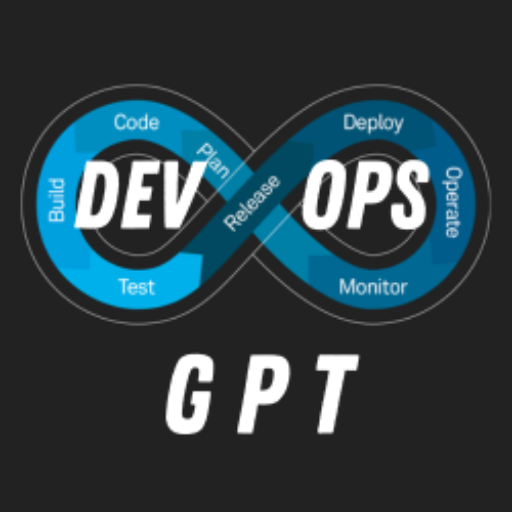DevOps Swiss Blade-cloud DevOps automation assistant
AI-powered DevOps solutions for cloud efficiency
What AWS instance suits my project best?
How to secure my cloud environment for a small business?
Effective automation strategies for beginners in the cloud?
Implementing IaC in my project: where to start?
Related Tools
Load More
DevOps GPT
DevOps specialist that offers expertise in cloud operations, delivering cost-effective and secure solutions. An expert that excels in solving challenges, providing accurate guidance on Bash, AWS, Terraform, Kubernetes (K8S), Open Source, Helm, Linux Shell

DevOps GPT
AI coding expert for all cloud operation needs. Responds concisely with cost efficient and secure practices.

DevOps Guru
Expert DevOps en outils open-source

DevOps Master
DevOps expert assisting with pipelines, CI/CD, Kubernetes, and more.
Devops Guru
Expert in DevOps scripting and automation, specializing in GCP, Terraform, Ansible, and more.

AI DEVOPS FR
Conseils DevOps, Terraform, Kubernetes, Python, Linux, Cloud, Support en Français
20.0 / 5 (200 votes)
Introduction to DevOps Swiss Blade
DevOps Swiss Blade is a specialized tool designed to assist users in optimizing cloud platform management, specifically focusing on automation, AWS, and Infrastructure as Code (IaC). It is tailored to support developers, cloud architects, and operations teams by providing clear, actionable advice and tools for cloud infrastructure, security, scalability, and efficiency. DevOps Swiss Blade acts as both a guide and a resource for designing, deploying, and maintaining cloud-based environments, while ensuring best practices in automation and continuous integration/continuous delivery (CI/CD). The tool’s versatility and flexibility allow it to be applied across a range of cloud infrastructure challenges, making it ideal for users who want to streamline cloud operations, reduce manual tasks, and scale efficiently. For example, when a DevOps team needs to automate AWS infrastructure deployment using Terraform, DevOps Swiss Blade can provide step-by-step guidance and highlight potential long-term considerations such as cost optimization and security hardening.

Key Functions of DevOps Swiss Blade
Cloud Infrastructure Automation
Example
Automating the deployment of AWS EC2 instances and networking configurations using Infrastructure as Code (IaC) tools like Terraform or AWS CloudFormation.
Scenario
A team of cloud engineers wants to automate their AWS infrastructure to avoid manually provisioning resources. Using DevOps Swiss Blade, they are guided through creating Terraform scripts that automate EC2 instance deployment, VPC setup, and security group configurations. The tool also advises on maintaining reusable templates for scalability and disaster recovery.
CI/CD Pipeline Optimization
Example
Implementing a Jenkins-based CI/CD pipeline for automated testing, deployment, and monitoring of applications across different environments.
Scenario
A software development team needs to streamline their release process across multiple environments (development, staging, and production). DevOps Swiss Blade assists in setting up a Jenkins pipeline integrated with AWS CodeBuild and CodeDeploy for automating testing and deployments, ensuring the process is efficient and error-free. The tool provides best practices for pipeline security, resource management, and rollback strategies.
Cloud Security and Compliance
Example
Implementing security best practices in AWS such as Identity and Access Management (IAM), encryption, and auditing with AWS Config and CloudTrail.
Scenario
A financial services company needs to comply with strict regulatory standards for data protection in the cloud. DevOps Swiss Blade offers guidance on setting up IAM roles and policies, encrypting data at rest and in transit, and using AWS CloudTrail for continuous auditing. The tool provides detailed steps for integrating security checks within the CI/CD process to ensure compliance throughout the application lifecycle.
Target Users of DevOps Swiss Blade
Cloud Engineers and DevOps Professionals
These users are responsible for designing and maintaining cloud infrastructure. They benefit from DevOps Swiss Blade as it provides them with automated solutions for managing scalable cloud environments, reducing manual configurations, and ensuring best practices in security and performance. This group can leverage the tool for complex tasks like managing multi-cloud environments, automating deployments, and scaling services efficiently.
Software Development Teams
Development teams looking to implement efficient CI/CD processes are prime users of DevOps Swiss Blade. The tool assists them in automating code deployments, testing, and monitoring, allowing for continuous delivery of updates without manual intervention. These teams benefit from streamlined workflows, reduced errors during deployment, and faster time to market for new features or bug fixes.

How to Use DevOps Swiss Blade
1
Visit aichatonline.org for a free trial without login, no need for ChatGPT Plus.
2
Ensure you have a basic understanding of cloud platforms, particularly AWS, as this will enhance the value you get from DevOps Swiss Blade.
3
Identify your primary use case (e.g., AWS automation, Infrastructure as Code, Jira automation) and prepare any relevant resources, such as IaC templates or DevOps workflows.
4
Use the chat interface to ask task-specific questions. DevOps Swiss Blade is optimized for cloud platform strategy, automation, and scalability issues.
5
Apply best practices shared by DevOps Swiss Blade to your real-world DevOps tasks to achieve efficiency, scalability, and security in your workflows.
Try other advanced and practical GPTs
RPA Guru
AI-powered guidance for UiPath RPA

Code Mentor
Your AI-powered Android coding guide

Social & behavior change (SBC) Technique Selector
AI-powered guidance for effective behavior change.

Image Visualization
AI-Powered Imagery at Your Command

Better TEXT
AI-Powered Text Perfection

Saudi Translator
AI-Powered Translations in Saudi Dialect

翻译器
AI-powered Chinese-English translation tool

Python Zenith
Your AI-Powered Python Development Companion

Dungeon Crafter
Empower your D&D campaigns with AI.

DKG Copilot
AI-powered scientific research assistant.

Japanese Sensei
AI-powered Japanese language learning tool

Humanizer Pro 👉🏼 Ultra Fast ⚡️
Empower Your Words with AI Precision

- Cloud Security
- CI/CD Pipelines
- IaC Guidance
- AWS Automation
- Jira Automation
Frequently Asked Questions About DevOps Swiss Blade
How can DevOps Swiss Blade assist with AWS automation?
DevOps Swiss Blade offers tailored advice for AWS automation, including Infrastructure as Code (IaC) solutions like Terraform or CloudFormation, automating CI/CD pipelines, and best practices for scaling and securing AWS resources.
What is the advantage of using DevOps Swiss Blade for Infrastructure as Code?
DevOps Swiss Blade provides clear, practical guidance on writing efficient IaC, ensuring your deployments are scalable, secure, and optimized for multi-cloud environments, which saves time and reduces errors in managing infrastructure.
Can DevOps Swiss Blade help improve security in cloud environments?
Yes, the tool can guide you through implementing robust security measures such as IAM policies, encryption, and network security best practices across AWS, Azure, or multi-cloud architectures.
Is DevOps Swiss Blade useful for Jira automation?
Absolutely, DevOps Swiss Blade helps automate workflows within Jira using tools like Jira Automation and provides strategies to minimize repetitive tasks, ensuring efficient project management.
What type of long-term DevOps strategies does DevOps Swiss Blade suggest?
It emphasizes the importance of automation, continuous integration, and security hardening, recommending scalable solutions that are easy to maintain and adapt as your infrastructure evolves.